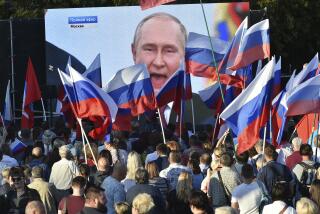Money Alone Won’t Pay This Bill : Gorbachev now faces the test the West hoped would never come
- Share via
Soviet President Mikhail S. Gorbachev’s reforms broke up the old Soviet economic machinery before anything was ready to replace it.
Now the ultimate test, no longer distant or abstract, is upon him and his fractious people. Even for the man who talked his way out of the Cold War, the odds against saving his economy seem formidable.
Turmoil in the Soviet Union is emphatically not in the world’s interest. That being the case, Washington must examine closely a gloomy assessment by the World Bank and other financial analysts that the Soviet economy is in free fall. They also say that a swift transition to a market economy is Moscow’s only hope, yet they caution that no amount of Western aid could revive the old economy.
A backlash to change is the one thing Moscow fears most. The Soviets will need U.S. and others’ help, not to revive their economy but to soften unemployment and to feed millions who might otherwise go hungry while they build a new economy.
As Times writer Michael Parks reported, Soviet economists saw the collapse coming, in an 80% inflation rate when they counted the black market, in runaway growth in money supply, in falling oil production and, finally, in all- but-empty markets.
Even with the best of planning, reversing field would be hard enough. Some military men, the church and die-hard Communists clamor for a crackdown, more central authority and less of the free market. Liberal reformers insist that faster change is the only alternative to chaos.
In the face of this, the Soviet Parliament gave Gorbachev more power, on paper, to hold the Soviet federation together but withheld a way of enforcing his orders. Gorbachev, in turn, picked for vice president Gennady I. Yanayev, a party regular and obviously a wary man. “We have no right to pursue an unpredictable, convulsive policy in a country with 300 million people,” he said. It’s far too late to embrace caution as a political savior for a world power already deeply changed.
More to Read
Get the L.A. Times Politics newsletter
Deeply reported insights into legislation, politics and policy from Sacramento, Washington and beyond. In your inbox twice per week.
You may occasionally receive promotional content from the Los Angeles Times.








